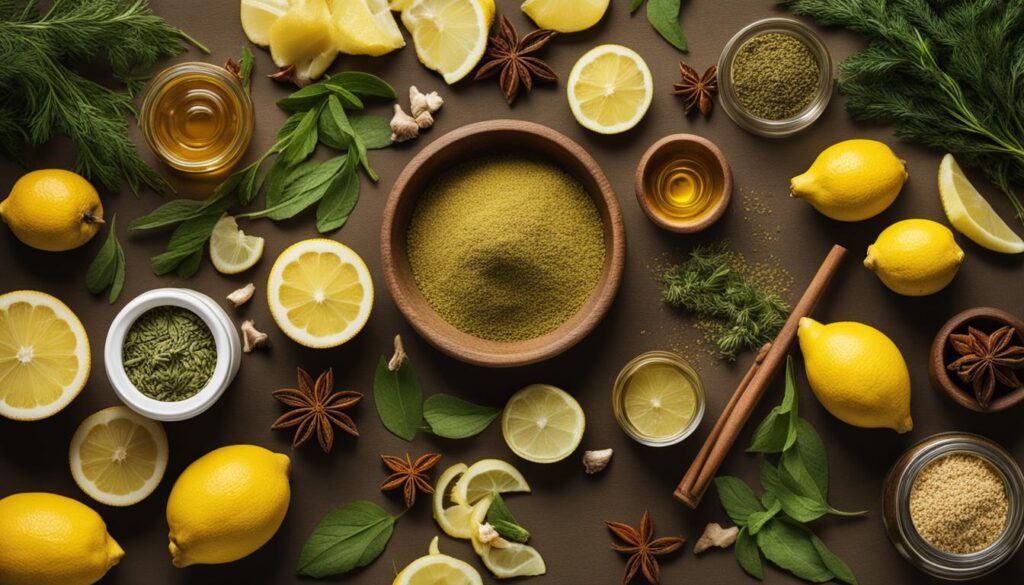Have you been searching for effective ways on how to prevent stomach cramps or remedies offering quick relief for stomach cramps? This guide is here to help you navigate the often discomforting world of stomach cramps with natural and practical solutions. We delve into the very essence of managing stomach cramps and introduce you to a myriad of tips focused on easing stomach cramps and measures aimed at reducing stomach cramps. Here, you will uncover the potential of natural remedies for stomach cramps and the role of lifestyle changes and over-the-counter treatments for that much-needed relief. Be sure to consult with a healthcare professional for personalized advice, as these tips are not a substitute for medical counsel.
Key Takeaways
- Stomach cramps can be effectively managed with a blend of natural remedies, lifestyle changes, and over-the-counter treatments.
- Hydration, ginger, and the BRAT diet are potent natural remedies for stomach discomfort.
- Keeping mental stress in check and embracing frequent, small meals can contribute significantly to digestive health.
- Simethicone-based medications, antacids, acid reducers, and laxatives can offer quick relief for stomach cramps in case of necessity.
- Recognizing and avoiding known food triggers is crucial in preventing stomach cramps.
- Always consult with a healthcare professional before beginning any self-treatment for stomach cramps.
- Stomach cramps might be indicative of an underlying health issue, requiring immediate medical attention.
Understanding Stomach Cramps and Their Causes
Stomach cramps can be a jarring experience, impacting overall wellness and daily life. They can come and go sporadically, or remain consistent; mild and uncomfortable or intense and debilitating. Understanding their cause forms the first step towards identifying the most suitable means to stop stomach cramps and find relief for stomach cramps.
Common Symptoms of Digestive Distress
Stomach cramps usually present with other symptoms of digestive distress. These may manifest as heartburn, nausea, bloating, excessive gas and bouts of constipation and diarrhoea. Various remedies for abdominal pain and additional symptoms focus on addressing these associated symptoms.
Identifying Factors That Contribute to Abdominal Pain
Several factors contribute to stomach cramps, influencing their onset and severity. Regular culprits include unhealthy diets rich in fats, spices, and processed foods, high stress levels, and certain existing medical conditions.
| Factors Causing Stomach Cramps | Typical Effects |
|---|---|
| Poor Diet | Causes upset stomach, bloating, and acid reflux. |
| High Stress Levels | Triggers gut inflammation, leading to discomfort and cramping. |
| Existing Medical Conditions | Conditions such as IBS and gastroparesis flare-up, causing cramps. |
When to Seek Immediate Medical Attention
While mild and irregular cramps typically do not require immediate medical attention, anyone experiencing severe and persistent stomach pain, vomiting blood, difficulty in breathing, or symptoms indicative of appendicitis should seek immediate medical intervention. Appendicitis typically manifests as a sharp, tender pain in the lower right abdomen, often accompanied by fever.
Stop Stomach Cramps with Effective Over-the-Counter Remedies
If you’re seeking quick relief for stomach cramps, over-the-counter remedies may be your best bet. They offer practical and efficient solutions, making them a staple in every home for dealing with abdominal discomfort.

Medications for Gas Pain Relief
Simethicone-based medicines such as Gas-X and Mylanta Gas are trusted go-tos for battling gas-related pains. Designed to break down gas bubbles in your stomach and intestines, they can serve as your first line of defense when accommodating meals trigger crampy gas formations.
Antacids and Acid Reducers for Heartburn
Taming persistent heartburn is a familiar struggle if you regularly consume fatty or spicy foods. Antacids like TUMS, and acid reducers such as Nexium and Prilosec OTC can neutralize and decrease stomach acid production, respectively, thereby offering relief for stomach cramps triggered by heartburn.
Laxatives and Anti-Diarrheal Treatments
When your tummy troubles extend to constipation or diarrhea, laxatives (MiraLAX, Dulcolax) and anti-diarrheals (Imodium, Pepto-Bismol) can provide critical support. It is, however, important that these are used correctly and prudently to avoid dependency or adverse effects.
Choosing the Right Pain Reliever: Acetaminophen vs. NSAIDs
While Acetaminophen (Tylenol) and NSAIDs (Aspirin, Ibuprofen) can both alleviate pain, the former is often a safer option for those with stomach cramps as it’s less likely to irritate the stomach. However, always stick to the prescribed dosage to prevent potential liver damage.
In conclusion, while these remedies provide numerous options for swift relief, it’s important to keep in mind that they are not substitutes for a balanced diet, healthy lifestyle, or professional medical advice. They are merely tools to help manage symptoms and should be used responsibly.
Natural Remedies for Stomach Cramps and Indigestion
The realm of natural healing presents effective ways to manage indigestion and stomach discomfort, encouraging your body’s own healing processes. Simple practices such as being mindful of hydration, incorporating particular foods known for their soothing properties, and following certain diets can help in both easing and preventing stomach cramps.

The Power of Hydration: Water as a Digestive Aid
Something as basic as water can serve as a potent natural remedy for stomach cramps. Hydration is a vital aspect of good digestive health, aiding in bowel movements and preventing symptoms like heartburn. In fact, often a glass of warm water in the morning can stimulate digestion and relieve discomfort.
Ginger’s Role in Easing Nausea and Vomiting
Praised for its medicinal properties, ginger has been widely recognized as beneficial in easing stomach cramps and reducing nausea. Whether enjoyed as a warm tea or included in your meals, ginger can provide respite from varying degrees of stomach turmoil.
The BRAT Diet: Simple Foods That Can Soothe Your Stomach
When it comes to tackling upset stomach and diarrhea, the BRAT diet has been a longstanding recommendation. Comprising Bananas, Rice, Applesauce, and Toast, these bland foods are gentle on the stomach, and can be effective natural remedies for stomach cramps, aiding in the ease of discomfort.
| Remedy | Benefits |
|---|---|
| Hydration | Aids in digestion and relieving symptoms like heartburn |
| Ginger | Reduces nausea and stomach discomfort |
| BRAT Diet | Provides gentle foods for the stomach, easing discomfort and diarrhea |
Lifestyle Changes for Preventing and Managing Stomach Cramps
Understanding how your lifestyle impacts your digestive health can be the first step to alleviating discomfort. Modifying eating habits, combating stress, and adopting targeted exercise routines can significantly reduce the occurrence and severity of stomach cramps.
Importance of Small, Frequent Meals for Digestive Health
Eating patterns directly influence how our bodies break down and absorb nutrients. Overburdening the digestive system with infrequent, large meals can trigger stomach cramps and other forms of discomfort. To manage stomach cramps effectively, it is recommended to consume smaller meals at regular intervals, providing our bodies with a steady supply of nutrients without overwhelming the digestive tract.
The Impact of Stress on Digestive Function and How to Mitigate It
Stress does more than hamper our mental wellbeing; it can also penetrate into our physical health, directly impacting digestive function. Excess stress can lead to stomach cramps and intensify digestive issues. Reducing this pressure through practices such as meditation, yoga, or simple deep-breathing exercises can alleviate these symptoms, providing more efficient digestion and reducing stomach cramps.
Exercise and Relaxation Techniques to Reduce Abdominal Pain
Exercise is often overlooked but is a powerful tool in managing abdominal discomfort. Regular light exercise helps improve digestion and prevent the build-up of gas, which can lead to stomach cramps. Additionally, relaxation techniques such as mindful breathing or progressive muscle relaxation can also help to ease tension in the abdomen, lowering pain levels and improving overall digestive health. Preventive measures like identifying food intolerances or allergies are also key in preventing discomfort.





